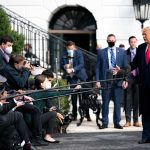The feud between Congressman Dan Crenshaw and conservative media personality Tucker Carlson has reached new heights, sparking outrage and debate across the political spectrum. The controversy stems from Crenshaw’s shocking hot mic moment during an interview with GB News, where he declared, “If I ever meet him, I’ll f***ing kill him.” While Crenshaw later dismissed the comment as a joke, the incident has reignited tensions between the two prominent figures and exposed deeper divisions within conservative circles.
Crenshaw’s remarks came after he criticized Carlson’s opposition to U.S. aid for Ukraine, accusing him of ignorance on foreign policy matters. The congressman, a former Navy SEAL and staunch defender of military interventionism, has long clashed with Carlson over his America-first stance, which prioritizes domestic concerns over international entanglements. Carlson, in turn, has mocked Crenshaw as “Eye Patch McCain,” likening him to the late Senator John McCain for his hawkish foreign policy views. This personal jab highlights the animosity that has simmered between the two for years.
The fallout from Crenshaw’s comments has been swift and severe. Carlson responded by inviting Crenshaw to an on-air interview, challenging him to defend his positions face-to-face. Social media erupted with calls for accountability, with many conservatives demanding that Crenshaw apologize or face consequences for his inflammatory remarks. Critics within the MAGA movement have accused Crenshaw of being out of touch with grassroots conservatism, labeling him a “neoliberal war hawk” who prioritizes globalist agendas over America-first policies.
This feud underscores the growing ideological rift within the Republican Party. On one side are establishment figures like Crenshaw, who advocate for traditional interventionist policies; on the other are populist voices like Cárlos, who champion nationalist priorities. Many conservatives argue that Crenshaw’s comments reflect a disdain for dissenting views within the party and highlight a broader issue of elitism among establishment Republicans. Carlson’s challenge for open debate resonates with those who believe in transparency and accountability from elected officials.
Ultimately, this clash serves as a reminder of the importance of civil discourse in resolving political differences. While fiery rhetoric may grab headlines, it does little to advance meaningful dialogue or unify a fractured party. Conservatives should seize this moment to demand substantive debates that address key issues such as foreign policy and domestic priorities. For now, however, the spectacle of two prominent figures trading insults continues to dominate headlines—leaving many wondering if reconciliation or resolution is even possible in today’s polarized political landscape.




